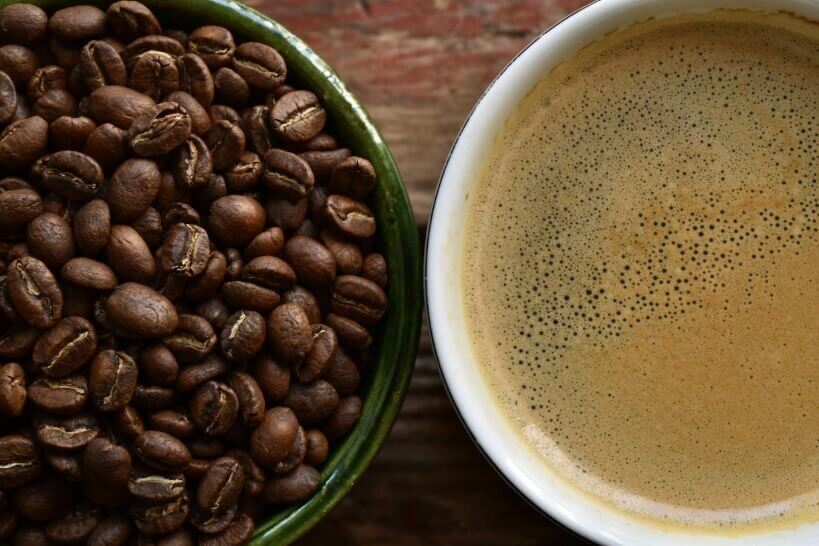Frankly, I remember how scary it felt when I started drinking espresso. No lie, yes I was afraid. Everyone had a recommendation, and many were contradictory. When I look back, the inevitable end was obvious, everyone had their own taste and I was now addicted to espresso.
That's why I'm going to feed you basic tips that no one can object to, to save you from confusion. We'll go from basic to advanced. In this way, you can base them on as you progress on your espresso journey.
Keep reading because a deliciously caffeinated victory awaits you!
1. No need to buy espresso beans
In fact, espresso beans aren't even a thing. They're actually just coffee beans that the roaster believes make great espresso, eheheh. But of course you can keep trying your favorite espresso beans.
Similarly, while most specialty coffees are Arabica, there is a long history of adding Robusta beans to espresso blends in Italy. The thing is, there really isn't a completely correct rule. You just try to get the best coffee.

2. Make sure it's freshly roasted
Like most foods, coffee is always good when fresh. Yes, I know, stop, don't shoot! I just said there are no rules, but let's call it a very strong recommendation. Try and buy coffees that have been roasted in the last week or two. Because coffees start to go completely stale within two weeks. It gets less and less delicious and you'll find it's getting harder and harder to get a thick layer of crema in your espresso, unfortunately.

3. Use the right grinder
Not all coffee grinders are created equal, and espresso is a tough art to grind in the right grinder. It is very important that the grinds are fine, of equal size and free from lumps. However, the grinder should not hold too much ground.
At least you can get a coffee grinder .

4. Use freshly ground coffee
Did I mention that coffee beans go stale? Well, ground coffee beans go stale even faster. That's why it's best to use freshly ground coffee beans when preparing any coffee.
If you are taking it directly in ground form, we recommend that you consume it within a week. You can invest in a good coffee storage container that you store in a cool, dark place and extend this period by two weeks.

5. Grind size matters
For espresso, you need to grind the coffee very finely. Not as much as Turkish coffee, before brewing a drop!
The reason for this is related to the speed of preparation of espresso. It only takes 30 seconds to make a shot of espresso. Within this short time, the water should absorb the full aroma of the coffee. The only way to do this is if the coffee is ground very finely. 
6. Preheat everything
Because espresso has a very small volume of liquid, it quickly loses its heat, especially when it comes into contact with a larger cold mass. To avoid this, I recommend preheating both the portafilter and the demitasse containers with hot water. 
7. Master tampons
First off, if your espresso machine came with a plastic machine that most people make, throw it straight into the recycling bin and opt for a metal one with some weight on the back. We need that weight to get a proper buffer! And what about plastic? 
8. Know the golden rule, but don't memorize
I'm not talking about the golden rules of life, do to others what you do to yourself, yes, but don't live according to it. I'm not talking about the golden rules of how to use an espresso machine. We all know that with the right dose, grind, compression, it should take 25 seconds to make a 2-ounce double shot.
Actually, this is an excellent beginner's guide, but don't be too hard on yourself for it. The main rule is to find the right settings that taste delicious to you. 
9. Keep everything clean
This is very important and often overlooked by everyone. It may seem like you're done when you have that delicious espresso in your hands, but you're not done! Aren't you going to drink when it's tomorrow? Well then you have to know how to leave it clean if you want it to be equally delicious.
Clean every day. Clean the portafilter with warm soapy water. These are where coffee oils can build up and eventually harden. 
10. Scales are better than scoops
It is always better to measure your coffee by weight rather than volume. It is very important to use a coffee scale. This is the only way to make sure you use the same amount of coffee every time. Consistency is key, especially when it comes to espresso. What could be worse than getting a perfect shot one day and not repeating it the next? That's why I recommend buying a coffee scale that is accurate to 0.1 g. 
11. Take the right dose
Now I think I've convinced you to weigh your coffee. You're probably wondering how much you should weigh. It also depends on the size of your portafilter and your tastes. However, roughly speaking: You can use 6 to 10 g for a single shot and 16 to 20 g for a double shot. 
12. Change your filter basket
If you have a bad espresso machine, you probably have a pressure filter basket. This is one of the easiest and least expensive upgrades. It should be replaced with a non-pressurized option that will provide a sweeter and smoother shot.
Our only caveat is that without enough ground beans it's harder to get a good shot from an unpressurized basket. That's why you can upgrade your coffee grinder first.
For this, the best brand we can recommend to you will definitely be Comandante . 
13. The importance of water temperature
If you have an automatic espresso machine that heats the water for you, go ahead and move on to the next tip. You already have an espresso machine that knows what it's doing...
However, if you are using a manual espresso machine and heating your brewing water in a kettle, I would like to remind you that the proper water temperature is vital for perfect extraction. If you use boiling water, you will burn the coffee. Instead, make sure it's in the 195 to 205 degree range. 
14. Water quality is also important
Now, friends, you may ask what is the quality of water, but I would like to remind you that 98% of coffee is water. I always recommend using filtered water when preparing espresso. It not only improves the taste, but also keeps the plumbing inside your espresso machine clean.
When coffee scientists researched the optimal water compositions for coffee, they said it was best to use soft but not too soft water. Some mineral content is crucial for best flavor.
15. The importance of good accessories
If you've mastered the basics of making espresso, how about adding a few essential accessories to your coffee bar? They make your life easier and increase your productivity. As a bonus, they also make great gifts for espresso lovers, as they are often small and affordable.
Here may be a brush, compression mat, batting box and some microfiber cloths to clean.





